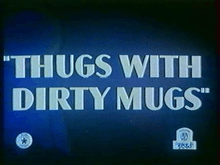Thugs with Dirty Mugs
| Thugs with Dirty Mugs | |
|---|---|
| Merrie Melodies series | |
 Title card from the 1944 Blue Ribbon reissue | |
| Directed by | Tex Avery |
| Produced by | Leon Schlesinger |
| Story by | Jack Miller |
| Voices by |
All uncredited: Tex Avery Mel Blanc John Deering |
| Music by | Carl W. Stalling |
| Animation by | Sidney Sutherland |
| Distributed by |
Warner Bros. Pictures The Vitaphone Corporation |
| Release date(s) | May 6, 1939 |
| Color process | Technicolor |
| Running time | Approx. 8 minutes 5 seconds (original film, including title card w/technical credits) |
| Language | English |
Thugs with Dirty Mugs is an eight-minute animated cartoon in the Merrie Melodies series produced by Leon Schlesinger, released to theaters by Warner Bros. on May 6, 1939. It was directed by Tex Avery, written by Jack Miller,[1] and animated by Sid Sutherland, with musical direction by Carl W. Stalling.
Its subject matter (movie gangsters) is a parody of Warner's famous cycle of crime films starring such actors as James Cagney, Humphrey Bogart, George Raft, and Edward G. Robinson. The title derives from the studio's 1938 acclaimed feature film, Angels with Dirty Faces, which starred the first two. It is similar to Avery's later MGM crime/detective-oriented cartoon, Who Killed Who?.
Plot summary
The film takes place in the fictional New York town of Everyville, which is home to a vast total of 112 banks.
The title card and technical credits are followed by introductions of the two lead characters: "F.H.A. (Sherlock) Homes" as police chief "Flat-Foot Flanigan with a Floy Floy," and "Edward G. Robemsome" (a caricature of Robinson) as notorious gang leader "Killer Diller." After these introductions, Killer and his gang are seen robbing every bank in the town in numerical order (except that they skip the 13th bank out of superstition) — with the newspaper Telegraph Post reporting the criminals' every move, and even declaring that they have robbed 87 banks in a single day. Despite the criminals' predictability and their endless sight gags (in which Killer does everything from causing one bank to behave like a casino machine to picking up a pay phone and inserting his gun into the speaker, resulting in the operator shrieking in terror and giving him lots of coins), the police are unable to arrest them. However, after so much bafflement, Flanigan himself gets help from an unlikely source: a man in the front of the theatre who had been sitting through the whole picture; he tells him that Killer is making plans to go to the estate of Mrs. Lotta Jewels at 10:00 in the evening. While Killer and his gang are spending time in said estate, listening to "The Lone Stranger" on radio, Flanigan and his men find the criminals and fire at them. Thus, Killer is captured, convicted, and given a long sentence — which is revealed to be a prison term in which he must write "I've been a naughty boy" on a blackboard one thousand times, much like schoolkids of that era. The imprisoned Killer blows a raspberry as the cartoon irises out.
Censorship
The cartoon was banned in Winnipeg, Manitoba in 1939, because censors "felt the film was just an excuse to show criminal activity."[2]
DVD release
- Thugs with Dirty Mugs is presented uncut and restored on the Looney Tunes Golden Collection: Volume 3.
See also
References
- ↑ Beck, Jerry; Friedwald, Will (1989). Looney Tunes and Merrie Melodies: A Complete Illustrated Guide to the Warner Bros. Cartoons. New York, NY: Henry Holt and Company. p. 87. ISBN 0-8050-0894-2.
- ↑ Forbidden Animation: Censored Cartoons and Blacklisted Animators in America by Karl F. Cohen — Google Boeken
External links
Thugs with Dirty Mugs at the Internet Movie Database